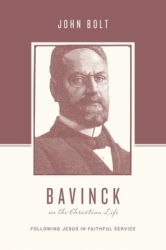First off, tell us about Herman Bavinck. Who was he? When did he live? How was he important?

John Bolt:
Herman Bavinck (1854-1921) was a contemporary of Abraham Kuyper and shares with Kuyper the distinction of being the theological heart of the revival of Dutch Reformed life and thought in the late nineteenth and early twentieth century commonly referred to as Neo-Calvinism. While Kuyper was the activist movement leader; Bavinck was the theological genius who brought the classic tradition of Reformed and Christian thought into a lively engagement with modern thought and life.
Books At a Glance:
Tell us about your own interest in Bavinck and his works. You’ve been studying him for a long time – how has all that come about?
John Bolt:
Bavinck has always been in the background of my theological studies beginning in seminary indirectly through his influence on Louis Berkhof and G.C. Berkouwer, the two pre-eminent theologians we were required to read in seminary. When I was in graduate school and had to choose a topic for my PhD dissertation, I eventually settled on Bavinck and the role of the imitation of Christ in his cultural-ethical ideal. After this work I knew that Bavinck would always be the most important theological mentor in my own work as a theologian.
However, I would not have been able to write this book on his understanding of the Christian life if the Lord had not opened up a totally unexpected door for me to participate in the translation of his magnum opus, the four-volume Reformed Dogmatics. Many of my Korean ThM students at Calvin Seminary had been instructed by their professors at home (often those who had done graduate study in The Netherlands) that they should study the theology of Bavinck. However, since only one section (The doctrine of God) had been translated into English they sought out people who could translate sections in which they were interested. At the time (in the early 1990s) one of those translators was John Vriend who regularly took up a place in the theology section of Calvin’s Hekman Library so he could access key reference works he needed for his translation work. In conversation with John we began to wonder together about the possibility of doing a full translation of the entire work and in January of 1994 we gathered together an ecumenical group of interested Reformed professors and pastors, formed the Dutch Reformed Translation Society, and started the work. The fourth and last volume was published in 2008.
Books At a Glance:
You mention that “grace restores nature” is a notion that features prominently in Bavinck. What do you – what did Bavinck – mean by that?
John Bolt:
Although this theme has been used to capture the fullness of Bavinck’s theological vision, I always point out that it is the answer to only one question: “What is the relation of grace to nature”? Bavinck’s answer rejects other possible answers that set grace against nature, whether it be to abolish nature or to elevate humanity above nature. For Bavinck, nature’s integrity as God’s good creation is maintained in the redemptive work of Christ. The grace of God that comes because of Christ’s work and in the power of the Holy Spirit, heals the brokenness of a sin-ravished creation. To put this metaphysically: grace does not alter our human nature, it heals that which is corrupted by sin. Salvation makes us fully human.
Books At a Glance:
What are some other outstanding features of Bavinck’s theological work? What were the areas of his most significant contributions?
John Bolt:
The Reformed Dogmatics is his major contribution, but he was also interested in and wrote extensively, especially in the last decade of his life, on ethics, psychology, and pedagogy. I am presently at work translating and editing an unpublished hand-written manuscript of 1100 pages on Reformed ethics. Lord willing, this will come out as a three-volume work within the next five years and will be a significant contribution to evangelical ethics.
In addition to his academic work, I believe that Bavinck’s most important contribution to the Dutch Reformed Church was in theological education as he tried to bring unity to a division between those who wanted a broad university-based theological education and those whose ideal was a more restrictive, focused on the church, seminary education. Bavinck wrote three monographs of about eighty pages each on the subject of theological education and making those available in English is one of my long-term goals.
Books At a Glance:
We somehow often perceive theologians as only academically oriented and forget that they are Christians also – Christians who like us must experience and practice their faith in all its life-dimensions. I suspect that many who know of Bavinck as a great Reformed theologian may be surprised to see a book so “practically” oriented as Bavinck on the Christian life. Tell us about Bavinck in this regard – give us a sense of his thinking regarding what is sometimes called “experiential Christianity.”
John Bolt:
I think I can do this best with a lengthy quote from my book (it’s on page 29). It’s in an introduction to a Dutch translation on the lives and works of the Scottish Presbyterian brothers, Ebenezer and Ralph Erskine. Here’s how he describes the piety of the Erskines:
It constantly moves between the two poles of sin and grace, law and gospel. It descends, on the one hand to the depths of human heart, unsparingly removes all covers and pretenses used by men to insulate themselves from the holiness of God, and exposes them in his poverty and lowliness before the face of God. On the other hand, it also comes to those men, thus made contrite in spirit, with the promises of the Gospel, unfolding its riches from all sides and applying them to all circumstances of life.
He then adds a brief lament about the devotional literature of his own day:
[In current literature] the true depth knowledge of the soul is missing. It seems that we no longer know what sin and grace, guilt and forgiveness, regeneration and conversion are. In theory we know them well, but we no longer know them in the depth reality of life. For this reason the devotional literature of previous times always leaves a different impression than that of the present. Because, although we stand at some distance from it and its form is antiquated, it is and remains natural, in the true sense of the word, while that of the present, when it deals with the soul, seems unnatural and artificial. We feel, when we read the old writers, that we are offered a piece of life; it is reality itself, that we are privileged to view.
Books At a Glance:
You make a lot in your book about Bavinck and Christian discipleship. According to Bavinck what does Christian discipleship look like? Is it possible to capture this just in summary?
John Bolt:
It is a Trinitarian vision that starts with being united with Christ’s death and resurrection and culminates in living in God’s creation, to his glory, in the power of the Holy Spirit. A disciple honors Jesus Christ as Lord in all dimensions of creaturely life: in marriage and family, in work, in society, in culture—especially education—and in public life as a citizen.
Books At a Glance:
Your book is a great first place to get acquainted with Herman Bavinck. But after that, where is a good place for someone to begin reading Bavinck himself?
John Bolt:
I would recommend his one-volume biblical theology, Our Reasonable Faith.
Then, for those who want to test the flavor of his Reformed Dogmatics but are reluctant to devote the time required to plow through four volumes, I recommend the abridged one-volume edition recently published by Baker Publishing.
Though it is more narrowly devoted to the area of marriage and family I also recommend his The Christian Family (Christian’s Library Press, 2012) as an entry point.
For those who are interested in Bavinck’s more academic writings on non-dogmatic topics, I recommend Essays on Religion, Science and Society (Baker, 2008).

